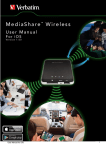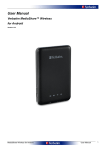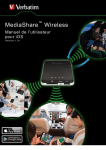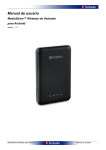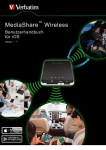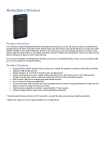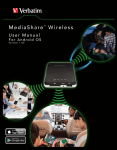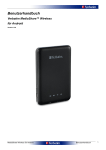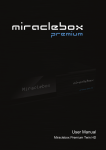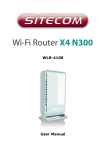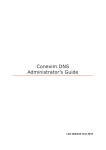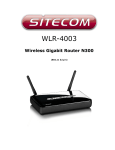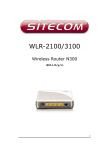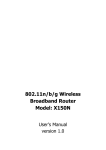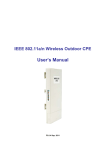Download USER MANUAL
Transcript
MediaShare Manuale utente per iOS Ve r s i o n e 1.01 Scaricamento da Applicazione Android su ™ Wireless Sommario SOMMARIO ................................................................. 2 INFORMAZIONI SUL MANUALE ............................... 3 PANORAMICA DEL PRODOTTO ............................... 3 CARATTERISTICHE DEL PRODOTTO .............................. 3 MODALITÀ OPERATIVE ................................................ 3 CARATTERISTICHE DEL PRODOTTO .............................. 3 REQUISITI DI SISTEMA ................................................ 3 VISTA DEL PRODOTTO ................................................. 4 CARICAMENTO DI MEDIASHARE .................................. 4 INSTALLAZIONE DEI DISPOSITIVI DI STORAGE ................ 4 Scheda di memoria SD ......................................... 4 Dispositivo di storage USB esterno ...................... 4 MODALITÀ DI GESTIONE...............................................9 Funzioni di copia e cancellazione .........................9 MENU SETTINGS (IMPOSTAZIONI)...............................10 Impostazioni di MyMediaShare ...........................10 Impostazioni Wi-Fi e LAN ....................................10 Impostazioni Internet ........................................... 11 Pulsante Cancella cache .....................................12 USCITA DALL’APP MEDIASHARE .................................12 DISINSTALLAZIONE DELL’APP MEDIASHARE ................13 COME OTTENERE AIUTO ........................................13 LIMITAZIONE DI GARANZIA ....................................14 CONFORMITÀ FCC ...................................................14 UTILIZZO DEI DISPOSITIVI MOBILI .......................... 5 DICHIARAZIONE DI CONFORMITÀ CE ...................14 INSTALLAZIONE DELL’APP ............................................ 5 CONNESSIONE WIRELESS DEL PROPRIO IPHONE/IPAD ............................................................. 5 AVVIO DELL’APP ......................................................... 5 FUNZIONALITÀ DI BASE ............................................... 6 Riproduzione della musica ................................... 6 Riproduzione dei video ......................................... 7 Visualizzazione delle foto ..................................... 7 Condivisione delle foto ......................................... 8 Visualizzazione di documenti ............................... 9 CANADA IC RSS-210:2010 .......................................14 Manuale utente per iOS DIRETTIVA WEEE .....................................................14 DIRITTI .......................................................................14 2 dispositivo alla porta USB del computer per mezzo del cavo USB fornito. Il dispositivo viene automaticamente montato sulla scrivania o in “Risorse del computer”. In questa modalità la batteria di MediaShare Wireless SD/USB viene caricata ed è possibile trasferire i file tra il computer una scheda di memoria SD installata o un’unità USB installata. Informazioni sul manuale Questo manuale descrive come usare il dispositivo Verbatim MediaShare Wireless SD/USB con il proprio smartphone o tablet iOS. Se invece si desidera usare il dispositivo MediaShare Wireless SD/USB con uno smartphone o tablet Android, scaricare il manuale per l’utente di “MediaShare Wireless per Android”. Panoramica del prodotto 2. Connessione wireless. Alimentare il dispositivo e usare il dispositivo mobile per cercare le connessioni wireless disponibili. Eseguire lo streaming di musica o video precedentemente salvati su una scheda SD o su un’unità flash. Il dispositivo portatile Verbatim MediaShare Wireless SD/USB consente di utilizzare schede di memoria SD e dispositivi di storage USB esterni come supporti accessibili da Wi-Fi. È sufficiente inserire la scheda di memoria SD nell’alloggiamento SD o connettere il dispositivo di storage USB esterno alla porta USB integrata. Alimentando l’unità sarà possibile accedere in modalità wireless a video, musica, fotografie, dati ed eseguirne lo streaming sul proprio iPad®, iPhone®, tablet e smartphone Android™. Non ci si deve più preoccupare di esaurire lo spazio dei propri dispositivi mobili. Dimensioni prodotto: 112 mm X 78 mm X 14 mm Per la massima portabilità, MediaShare Wireless è dotato di una batteria ricaricabile integrata. Connetterlo a qualsiasi porta USB disponibile sul computer per caricare la batteria. Radio Wi-Fi: Standard: 802.11 b/g/n Frequenza: 2.4 GHz Velocità: 72 Mbps a 20 MHz / 150 Mbps a 40 MHz Caratteristiche del prodotto Supporta schede di memoria SDXC, SDHC e SD con capacità fino a 128 GB. Per MicroSD e MiniSD è necessario un adattatore SD. Supporta dispositivi di storage USB Streaming multimediale su 5 utenti connessi simultaneamente in Wi-Fi* Accesso e streaming di musica, video, foto e dati da una scheda di memoria SD o da un dispositivo di storage USB esterno usando l’app mobile gratuita personalizzata che supporta i sistemi operativi iOS e Android Porta micro USB integrata per carica e funzione di trasferimento dati Fino a 9 ore di durata continua della batteria** In modalità di spegnimento, possibilità di caricare altri dispositivi elettronici portatili attraverso la porta host USB di MediaShare. Funzione di ricerca per individuare i file e accedervi Capacità di accesso a Internet tramite wireless, con supporto delle velocità 802.11 b/g/n Supporta strumenti client su piattaforme multiple, incluse iPad/iPhone/Android * Prestazioni di streaming limitate dalla larghezza di banda Wi-Fi, dalla velocità di trasmissione dei file codificati e dalla capacità di buffer del riproduttore. ** Durata della batteria soggetta alle normali condizioni e configurazioni d’uso. Modalità operative Esistono tre modalità operative principali. 1. Connessione USB diretta. Collegare il Manuale utente per iOS 3. Modalità bridge WAN wireless. Dopo aver abilitato la funzione bridge Internet, collegare MediaShare Wireless al proprio router wireless esistente per ottenere l’accesso a Internet. Caratteristiche del prodotto Sicurezza Wi-Fi: WPA-PSK WPA2-PSK WPA/WPA2-PSK mista (predefinita) Disabilitato Porta dispositivo USB 2.0: Per trasferimento dati e carica Batteria: Capacità di 3000 mAh Si carica dalla porta USB micro-B Tempo di carica fino a 7 ore Certificazioni normative: FCC (Classe B), CE, IC RSS-210:2010 (Canada), CEC-2012-BCS (California, Requisito di efficienza del caricabatteria) Requisiti di sistema Connessione Internet (per scaricamento di app e manuale utente e per uso con la funzione bridge internet opzionale) App iOS MediaShare wireless (scaricabile gratuitamente dall’app store iTunes) Richiede il dispositivo di storage collegato (minimo 1 GB): Scheda SD (Classe 4 o maggiore) o unità flash USB o disco rigido USB 200 MB di storage disponibile sulla scheda SD installata o sul dispositivo di storage USB riservato per le funzioni di sistema e quindi non disponibile per i dati utente. iPad, iPhone or iPod Touch che esegue iOS 4.0 o versione successiva. 3 Vista del prodotto 1 2 3 4 8. Porta USB dispositivo 9. Pulsante di accensione Usare il cavo USB incluso per connettersi a un computer tramite USB 2.0 per abilitare il trasferimento di dati. Usare il cavo USB incluso per connettersi a una porta USB o a un adattatore di carica USB per caricare il dispositivo Accende e spegne il dispositivo. Caricamento di MediaShare 5 9 6 8 COMPONENTE 1. LED livello batteria 2. LED lettura / scrittura 3. LED Wi-Fi 4. LED internet 5. Porta USB host 7 DESCRIZIONE Verde ACCESO: La carica della batteria è superiore al 30%. Rosso ACCESO: La carica della batteria è compresa fra il 10% e il 30%. Rosso lampeggio rapido La carica della batteria è esaurita e in breve tempo l’unità verrà spenta. Verde con lampeggio lento (ogni 2 secondi): La batteria è in carica. Verde con lampeggio lento (ogni 1,5 secondi): Il dispositivo sta per essere spento. LED spento: Il dispositivo è spento. Durante la modalità disco Wi-Fi: Blu ACCESO: La connessione della memoria ha successo Blu lampeggiante: È in corso la lettura o la scrittura della memoria. In modalità Lettura scheda: Blu ACCESO: Connessa a USB 2.0 Blu lampeggiante: Connessa a USB 2.0 con lettura o scrittura in corso. Il LED blu mostra lo stato della connessione Wi-Fi. Il lampeggio indica che è in corso l’inizializzazione. ACCESO indica che l’inizializzazione Wi-Fi è stata completata. Il LED è SPENTO nelle seguenti situazioni: Il dispositivo è acceso, ma il segnale Wi-Fi è debole. Il dispositivo è spento. Il dispositivo è in modalità Mobile ma la funzione Wi-Fi è spenta. Verde: Connesso a Internet tramite il bridge. Spento: Non connesso a Internet. Inserire un’unità flash USB o un disco rigido USB per l’accesso Wi-Fi. In modalità di spegnimento, la porta USB può essere usata per caricare uno smartphone o tablet connesso. 6. Pulsante di Inserire un piccolo strumento (ad esempio un reimpostazione fermaglio per fogli) per premere il pulsante e reimpostare il dispositivo alla configurazione definita in fabbrica. 7. Alloggiamento Inserire una scheda SD per l’accesso Wi-Fi. scheda SD Inserire una scheda microSD usando un adattatore adeguato. Manuale utente per iOS Usando il cavo USB fornito, connettere MediaShare a una porta USB alimentata o a un adattatore di carica USB per caricare la batteria integrata. La carica completa della batteria può richiedere fino a 7 ore. Installazione dei dispositivi di storage MediaShare non contiene unità di storage interne. È necessario connettere una scheda SD o un dispositivo di storage USB prima di poter utilizzare MediaShare con il proprio smartphone o tablet. Dopo aver connesso la scheda SD o il dispositivo USB, MediaShare riserverà fino a 200 MB della propria capacità per i file temporanei e altre funzioni di sistema. Questo spazio non è quindi disponibile per i dati dell’utente. MediaShare supporta dispositivi di storage che usano file system FAT, FAT32, exFAT (per SDXC) o NTFS. Nota: Prima di installare la scheda di memoria SD è il dispositivo USB, assicurarsi che MediaShare Wireless sia disattivato. Non toccare i connettori esposti della scheda di memoria SD. Scheda di memoria SD Individuare l’alloggiamento della scheda di memoria SD. Inserire la scheda di memoria. Spingere delicatamente fino in fondo la scheda di memoria finché non si blocca in posizione. Dispositivo di storage USB esterno Individuare la porta host USB sul dispositivo. Inserire un’unità USB o il cavo del disco rigido portatile nella porta USB. 4 Utilizzo dei dispositivi mobili Installazione dell’app Accendere il dispositivo iOS (iPhone, iPod Touch or iPad) e assicurarsi che sia connesso a Internet. Fare clic sull’icona “App Store” sul desktop per accedere ad App Store. Cercare e individuare l’app “MediaShare Wireless”, fare clic su “Install” (Installa) e seguire sullo schermo le istruzioni per l’installazione. Una volta completato il processo di installazione, l’icona dell’app “MediaShare Wireless” si trova nel desktop. Connessione wireless del proprio iPhone/iPad Dopo avere immesso la password corretta, il prodotto appare nell’elenco come “Connected” (Connesso). Avvio dell’app Sul dispositivo mobile iOS, fare clic sull’icona “MediaShare” per avviare l’app. La schermata iniziale appare come segue. La schermata mostra cartelle e file del dispositivo selezionato (MediaShare o smartphone/tablet). È possibile commutare fra questi due dispositivi facendo clic su “MyMediaShare” o “My Device”. 1. 1. Accendere MediaShare e attenderne l’inizializzazione. Il LED blu Wi-Fi del dispositivo deve passare da lampeggiante a stabilmente ACCESO per indicare che il processo di installazione è stato completato. 2. Fare clic sull’icona “Settings” (Impostazioni) nel desktop del dispositivo mobile. 3. Fare clic su “Wi-Fi”. Nell’elenco Network dovrebbe apparire il nome di rete “Verbatim-XXXX”. Fare clic, ad esempio, su “Verbatim-866A”. “866A” fa parte del SSID e contiene gli ultimi 4 caratteri del MAC Address del dispositivo. Quando si seleziona “Verbatim-XXXX” per la prima volta, viene chiesta la password Wi-Fi. La password predefinita è stampata sull’etichetta applicata sul fondo del dispositivo. Manuale utente per iOS In basso a destra appare il pulsante del menu con 3 puntini. Quando è selezionato, questo menu presenta le seguenti opzioni: Language (Lingua) Normalmente, la lingua predefinita è quella dello smartphone/tablet iOS al momento dell’installazione. Se in seguito si desidera selezionare un’altra lingua, è possibile sceglierla da questo menu. Sono supportate le seguenti lingue. Inglese Francese Italiano Tedesco Spagnolo Portoghese Croato Ceco Ungherese Polacco Russo Serbo Cinese Tradizionale Cinese Semplificato Coreano 5 About (Info) Il pulsante About (Info) elenco i numeri di versione del firmware e dell’app: Pulsante menu 3 puntini – consente di vedere l’elenco dei menu delle seguenti selezioni: About (Info), Language (Lingua), Copy (Copia), Now playing (Riproduzione in corso), Remove USBDisk1 (Rimuovi USBDisk1), Remove SDCard (Rimuovi SDCard). Riproduzione della musica Suggerimento: si consiglia di creare una o più cartelle per salvare tutti i file musicali in modo da semplificarne l'uso e l'organizzazione Copy (Copia) Fare clic sul pulsante Copy (Copia) per visualizzare lo stato di trasferimento dei file. Now Playing (Riproduzione in corso) Quando vengono riprodotti dei brani musicali in background, è possibile selezionare il pulsante Now Playing (Riproduzione in corso) per vedere le informazioni sul brano in riproduzione. Remove SDCard (Rimuovi SDCard) Un volume SDCard attualmente montato può essere smontato in modo sicuro usando il pulsante Remove SDCard (Rimuovi SDCard). I file musicali o audio possono essere riprodotti dall’interno di “MyMediaShare” o di “My Device”. Basta individuare il file musicale o audio che si desidera riprodurre. Fare clic sul file e la musica verrà riprodotta automaticamente. Nota: consultare il manuale del proprio dispositivo iOS per controllare se supporta i file musicali/audio che si desidera riprodurre Remove USBDisk1 (Rimuovi USBDisk1) Un volume USBDisk attualmente montato può essere smontato in modo sicuro usando il pulsante Remove USBDisk1 (Rimuovi USBDisk1). Funzionalità di base I pulsanti di azione di MyMediaShare si trovano nella parte superiore della schermata e sono elencati di seguito. Pulsante Home – torna alla schermata principale. Usare le seguenti icone per controllare la riproduzione musicale: Quando si fa clic, il brano attualmente i riproduzione riparte da 0.00. Quando si fa clic, viene riprodotto il brano precedente. Pulsante Visualizza - passa alla visualizzazione Elenco o Miniature. Quando si fa clic, viene riprodotto il brano successivo. Pulsante Settings (Impostazioni) – cambia le configurazione di MediaShare. Quando si fa clic, inizia la riproduzione del file musicale o audio. Pulsante Back (Indietro) – torna alla schermata precedente Quando si fa clic, la riproduzione della musica viene messa in pausa/arrestata. Pulsante Manage (Gestisci) – gestore file per condividere, copiare, eliminare e trasferire file Ci sono cinque modalità di riproduzione: 1. Casella Search (Cerca) – consente di cercare uno specifico nome di file e/o estensione. Manuale utente per iOS Ripetizione di tutti i brani: i file musicali o audio vengono riprodotti in sequenza e la riproduzione si interrompe facendo clic sul pulsante di pausa. (Modalità predefinita) 6 2. 3. 4. 5. Riproduzione del brano corrente: la musica attualmente in riproduzione verrà arrestata e la riproduzione ripartirà da 0.00. Ripetizione del brano corrente: il lettore riprodurrà sempre il brano corrente e interromperà la riproduzione solo facendo clic sul pulsante di pausa. Riproduzione casuale di tutti i brani: i file musicali o audio verranno riprodotti casualmente. Riproduzione dell’elenco corrente: i file musicali o audio verranno riprodotti sequenzialmente. Suggerimento: per far avanzare rapidamente o riavvolgere la musica, è possibile selezionare e far scorrere il pulsante di avanzamento della musica Suggerimento: è possibile uscire in qualsiasi momento dall'interfaccia del lettore musicale e la musica continuerà a essere riprodotta nel sottofondo Riproduzione dei video Suggerimento: si consiglia di creare una o più cartelle per salvare tutti i file video in modo da semplificarne l'uso e l'organizzazione I file dei filmati o video possono essere riprodotti dall’interno di “MyMediaShare” o di “My Device”. Basta individuare il file del filmato o video che si desidera riprodurre. Fare clic sul file e la musica verrà riprodotta automaticamente. Nota: consultare il manuale del proprio dispositivo iOS per controllare se supporta i file musicali/audio che si desidera riprodurre, i dispositivi iOS supportano normalmente i file video H.264 e MPEG-4 nei formati fi file .m4v, .mp4 e .mov. Le prestazioni di riproduzione dipendono dalla velocità di trasferimento dati del file video codificato, dalla robustezza della connessione Wi-Fi e dal numero di Manuale utente per iOS utenti simultanei. Se il video viene riprodotto ma a volte si blocca durante la riproduzione, è possibile provare queste operazioni per migliorare le prestazioni di riproduzione video: 1) Copiare il file video sul proprio smartphone/tablet e avviare la riproduzione dallo smartphone/tablet. 2) Ridurre il numero di utenti simultanei in streaming. 3) Ricodificare il file video con una velocità di trasferimento dati inferiore. Per impostazione predefinita, il lettore video è in modalità orizzontale. Usare le seguenti icone per controllare la riproduzione dei filmati: Quando si fa clic, il filmato attualmente in riproduzione si arresta e si esce da Movie Player Interfaccia. Quando si fa clic, il filmato viene scalato in base alle dimensioni dello schermo. Per far avanzare rapidamente o riavvolgere il filmato, selezionare e far scorrere il pulsante di avanzamento. Per aumentare o diminuire il volume, selezionare e far scorrere il controllo del volume. Premere e tenere premuto per riavvolgere rapidamente il filmato durante la riproduzione. Premere e tenere premuto per fare avanzare rapidamente il filmato durante la riproduzione. Quando si fa clic, inizia o riprende la riproduzione del filmato. Quando si fa clic, mette in pausa la riproduzione del filmato. Visualizzazione delle foto Suggerimento: si consiglia di creare una o più cartelle per salvare tutti i file delle foto in modo da semplificarne l'uso e l'organizzazione 7 Nota: attualmente, MediaShare supporta file immagine .jpg, .tif, .gif e .bmp. Le immagini supportate possono essere visualizzate come miniature o come elenco, come appare nella schermata che segue. Qualsiasi immagine non supportata può essere visualizzata come miniatura generica o icona. Fare clic sul pulsante per riavviare o riprodurre di nuovo la presentazione. Fare clic sul pulsante per riprodurre una volta la presentazione, che si fermerà sull’ultima immagine. Fare clic sul pulsante per tornare alla schermata precedente. Durante la riproduzione della presentazione può essere aggiunta della musica di sottofondo. Pulsante di arresto/continuazione riproduzione - per arrestare o continuare a riprodurre la musica di sottofondo. Pulsante di selezione - per cercare e individuare il file o i file da riprodurre come musica di sottofondo. Fare clic sul pulsante di ritorno per tornare alla presentazione. Fare clic su un’immagine per visualizzarla. Pulsante di ripetizione – quando viene premuto, il sottofondo musicale continua con lo stesso brano. Per impostazione predefinita, questa opzione è disattivata. Condivisione delle foto Esistono alcune opzioni per condividere foto/immagini con amici e famigliari, ad esempio mediante e-mail, salvataggio sull’Album Foto del dispositivo o caricamento in Facebook. Nota: per condividere le foto/immagini via e-mail o accedere a qualsiasi social network è necessaria una connessione Internet Quando si fa clic, inizia o riprende la riproduzione della presentazione. Per controllare la presentazione sono disponibili alcune funzioni. È possibile scorrere il dito attraverso lo schermo per visualizzare manualmente le immagine, oppure fare clic su pulsante di riproduzione per avviare automaticamente la presentazione di diapositive. Una volta selezionata una foto Fare clic sul pulsante Share (Condividi) nella parte superiore destra della schermata per visualizzare le tre opzioni di condivisione foto che sono disponibili. Fare clic sul pulsante di ritorno per tornare alla schermata precedente. Fare clic sul pulsante per mettere in pausa la presentazione e premerlo di nuovo per riprenderla. Manuale utente per iOS Pulsante e-Mail – quando si fa clic su di esso, l’app di e-mail predefinita viene lanciata automaticamente con la foto/immagine selezionata come allegato. Aggiunta a foto – quando si fa clic su di esso, la foto selezionata viene salvata nell’Album Foto del dispositivo, che per impostazione predefinita è il Rullino Foto. 8 Nota: per consentire questa funzionalità è necessario permettere a MediaShare Wireless l'accesso alle foto del proprio dispositivo. Potrebbe essere richiesto di consentire a MediaShare l'accesso al Rullino Foto. È importante accettare la richiesta. Se non lo si è ancora fatto, lo si deve abilitare per mezzo di Settings (Impostazioni) -> Privacy -> Photos (Foto) -> MediaShare e spostare il cursore da OFF a ON Caricamento su Facebook – quando si fa clic su di esso, si viene indirizzati all’app Facebook, se è già installata, o sulla schermata di accesso al sito web. Sono necessari il nome e la password di Facebook. schermo. Questo indica che l’e-mail è stata inviata con successo. Se l’invio dell’e-mail viene annullato, nell’angolo inferiore sinistro appare il messaggio “Mail Canceled” (Invio annullato). Modalità di gestione È possibile fare clic in qualsiasi momento sul pulsante Manage (Gestisci) per entrare nella modalità File Manage (Gestione file) e condividere, copiare, eliminare e trasferire i file. Per uscire dalla modalità di gestione, fare clic sul pulsante Done (Fine) . Per gestire i file in MediaShare, entrare in modalità di gestione da “MyMediaShare”. Per gestire i file sul proprio smartphone/tablet, entrare in modalità di gestione da “My Device”. Visualizzazione di documenti L’app MediaShare supporta file keynote, numeri, pagine, Excel, Word, .pdf, .txt e .ppt. Funzioni di copia e cancellazione In fondo allo schermo vi sono delle nuove icone. Le loro funzioni appaiono di seguito. Per aprire o visualizzare un documento, fare semplicemente clic sul file. In tal modo si apre automaticamente il file supportato. Fare clic sul pulsante per tornare alla schermata precedente, oppure Fare clic sul pulsante Select All (Seleziona tutto) per selezionare tutti i file. Su ogni file appare un segno di spunta blu. Fare clic si nuovo per deselezionare tutti i file. Fare clic sul pulsante per inviare il file tramite e-mail, come mostrato nella schermata che segue. Suggerimento: facendo clic sulle singole miniature è possibile selezionare un unico file o più file. Copia di file. Quando si entra in modalità di gestione da MyMediaShare, la funzione di copia copia un file da MediaShare allo smartphone/tablet. L’icona della copia contiene una freccia rivolta in basso. Nota: per inviare e-mail è necessaria una connessione Internet. Fare clic sul pulsante e-Mail, l’app di e-mail predefinita viene avviate automaticamente e il documento selezionato viene inviato come allegato. Una colt ainviata l’e-mail, apparirà un messaggio “Mail Sent” (Posta inviata) nell’angolo inferiore sinistro dello Manuale utente per iOS Nota: le cartelle chiamate “Documents” (Documenti), “Movies” (Filmati), “Music” (Musica) e “Photos” (Foto) verranno create dall'app nel dispositivo iOS. Per accedere a questi file è necessario spostarsi sui file per mezzo dell'app MediaShare Copia di file. Quando si entra in modalità di gestione da My Device, la funzione di copia copia un file dallo smartphone/tablet a MediaShare. L’icona della copia contiene una freccia rivolta in alto. Quando si copiano i file, è necessario definire la cartella di destinazione. Se lo si desidera, è possibile 9 creare una nuova cartella. Per creare una nuova cartella, fare semplicemente clic sul pulsante “New Folder” (Nuova cartella). Immettere il nome della nuova cartella e fare clic sul pulsante “Create” (Crea). Il nome della cartella può essere lungo da 2 a 26 caratteri. Suggerimento: è possibile uare questa funzione per eseguire il backup di tutte le foto dal Rullino Foto dei dispositivi iOS. È possibile fare clic sull’icona Status (Stato) per vedere l’elenco dei file contenuti nella coda di trasferimento, oltre all’elenco dei file che sono già stati copiati con successo. Quando si fa clic tutti i file selezionati vengono eliminati. Nota: i file copiati/trasferiti con successo saranno elencati nella finestra "recenti". Fare clic sul pulsante "Clear" (Cancella) per rimuovere o svuotare l'elenco. Per uscire dalla modalità di gestione, fare clic sul pulsante Done (Fine). Menu Settings (Impostazioni) Dall’interno di MyMediaShare, facendo clic sull’icona Settings (Impostazioni) è possibile accedere a svariate operazioni di configurazione. Impostazioni di MyMediaShare Nome host <Funzionalità riservata per funzioni future.> Utente <Funzionalità riservata per funzioni future.> Memorizzazione A MediaShare è possibile collegare una scheda di memoria SD o un dispositivo di storage USB per utilizzarla come dispositivo di storage locale. Fare clic su “Storage” per visualizzare il tipo, le dimensioni e lo spazio disponibile su ogni dispositivo di memorizzazione installato. Aggiornamento firmware Visitare periodicamente il sito web del supporto Verbatim per vedere se è stato pubblicato un nuovo file di firmware per questo prodotto. Se è disponibile un nuovo file di firmware, è possibile scaricarlo e installarlo come segue: Nota: Prima di tentare un aggiornamento del firmware, assicurarsi che le batterie del MediaShare Wireless e dello smartphone/tablet siano completamente cariche. 1) Salvare il nuovo file nella directory iniziale di una scheda di memoria SD o di un dispositivo di storage USB. 2) Collegare il dispositivo di storage precedente a MediaShare e accendere MediaShare. 3) Connettere il proprio smartphone/tablet a MediaShare. 4) Aprire l’app MediaShare e aprire la schermata Settings (Impostazioni). 5) Fare clic su “Firmware Upgrade” (Aggiornamento firmware). Il file del nuovo firmware verrà installato. Quando MediaShare viene riavviato, la connessione Wi-Fi con lo smartphone/tablet cade. Impostazioni Wi-Fi e LAN Nome dispositivo Per cambiare il nome del proprio dispositivo (SSID) dal nome predefinito “Verbatim-XXXX”, immettere un nuovo nome nella finestra di dialogo prevista. I caratteri possono essere una combinazione di lettere e numeri, fino a una lunghezza massima di 32. Manuale utente per iOS 10 Opzioni di sicurezza L’impostazione predefinita in fabbrica per la sicurezza wireless è Mixed WPA/WPA2-PSK (Mista WPA/WPA2-PSK). La password predefinita univoca è contenuta nell’etichetta applicata sul fondo del prodotto. Con questa finestra di dialogo è possibile cambiare la password o, in alternativa, impostare la sicurezza wireless a WPA-PSK, WPA2-PSK o Disabled (Disattivata) per non richiedere alcuna password. possibile mantenere una connessione allo smartphone/tablet e consentire inoltre al tablet/smartphone di raggiungere internet (anche se con velocità di connessione limitate). In questa modalità, il Router definisce ora il canale Wi-Fi e vengono stabilite due connessioni Wi-Fi (“A” e “B”) usando lo stesso numero di canale. La password deve essere lunga almeno 8 caratteri, ma non deve superare i 63 caratteri. Se si cambia la password e in seguito si dimentica la nuova password, è possibile ritornare all’impostazione della sicurezza predefinita in fabbrica eseguendo un reset per mezzo del pulsante di reset del pannello laterale. Modalità L’impostazione predefinita in fabbrica per la modalità di comunicazione wireless è 802.11 b/g/n. Con questa finestra di dialogo è possibile impostare in alternativa la modalità di comunicazione a 802.11 b, 802.11 g o 802.11 n. LAN Questa finestra di dialogo visualizza l’indirizzo MAC fisso del prodotto. In alternativa, è possibile visualizzare o cambiare l’indirizzo IP e la Subnet Mask correnti. Impostazioni Internet Poiché è il Router a eseguire la selezione del canale, e poiché regioni geografiche diverse usano gamme di canali diverse, MediaShare ha un altro motivo per conoscere la Regione quando viene abilitata la funzione bridge Internet. Bridge Internet La funzione Bridge Internet è disattivata per impostazione predefinita. Per abilitare il bridge, fare clic su “On” (Attiva), confermare l’impostazione della regione e quindi selezionare il router disponibile. Il funzionamento normale del prodotto richiede solo un’unica connessione wireless tra il proprio smartphone/tablet iOS e MediaShare. Per eseguire questa connessione, MediaShare definisce il canale Wi-da usare (da 1 a 11). L’impostazione predefinita in fabbrica per la selezione del canale è “auto”, che consente a MediaShare di scegliere automaticamente il canale migliore in base alla chiarezza del canale nell’ambiente corrente. La connessione viene rappresentata di seguito come connessione “A”. Nelle diverse regioni geografiche sono supportate gamme diverse di canali Wi-Fi. Se la propria regione non appare nell’elenco, scegliere una regione con la stessa gamma di canali della propria regione. Tuttavia, in questa modalità, se in seguito si vuole navigare in internet con il proprio smartphone/tablet, è necessario interrompere la connessione “A” e connettere invece il proprio smartphone/tablet a un router disponibile. Per comodità è possibile evitare questa situazione abilitando la funzione di bridge in MediaShare. Nella modalità bridge Internet, rappresentata di seguito, è Manuale utente per iOS 11 Selezionare la rete scelta dall’elenco delle reti individuate da MediaShare Wireless Canale Se il bridge Internet è disattivato, è possibile impostare facoltativamente il canale Wi-Fi da 1 a 11. La selezione predefinita è “auto” e permette a MediaShare di scegliere il canale con la migliore qualità del segnale. Se il bridge Internet è attivato, MediaShare userà il canale impostato dal router. Pulsante Cancella cache Fare clic sul pulsante Cancella cache per cancellare i file della cache SSID che sono stati salvati durante le sessioni precedenti o da applicazioni di terze parti. Salvataggio delle impostazioni Se il router richiede una password, immetterla per connettersi alla rete. Impostazioni facoltative:La connessione al router potrebbe richiedere anche l’impostazione di DHCP o di un IP statico. In caso di IP statico, immettere l’indirizzo IP, la Subnet Mask, il Gateway e le impostazioni DNS. Premere il pulsante Settings (Impostazioni) per salvare le impostazioni e attivare la funzione di bridge. Premere OK per confermare, tenendo presente che potrebbe essere necessario riconnettersi a MediaShare. Una volta che la funzione bridge Internet è attiva, il LED Bridge Internet sarà illuminato. Uscita dall’app MediaShare Per uscire dall’app MediaShare sui dispositivi iOS, è sufficiente premere il tasto Home sul dispositivo mobile. Per chiudere l’app MediaShare dopo l’uscita, fare clic due volte sul tasto Home per visualizzare l’elenco delle app in esecuzione sul fondo del dispositivo. Tener premuta l’icona dell’app MediaShare fino a quando non appare il segno meno “-“ nell’angolo superiore dell’icona dell’app. Fare clic sul segno meno “-“ per chiudere l’app. Manuale utente per iOS 12 Come ottenere aiuto Disinstallazione dell’app MediaShare Per disinstallare l’app dal proprio dispositivo mobile Apple, fare clic e tenere premuta l’app MediaShare per qualche secondo. Su tuttte le icone del dispositivo mobile appare un segno "X", come appare nella schermata che segue. Fare semplicemente clic sulla “X” situata nell’angolo superiore sinistro dell’icona MediaShare; questo rimuove l’app dal dispositivo mobile. Manuale utente per iOS Se vengono riscontrate difficoltà durante l’installazione o l’utilizzo del dispositivo Verbatim, visitare il sito Web principale dell’assistenza tecnica Verbatim all’indirizzo verbatim.com/support. 13 Limitazione di garanzia Verbatim offre al proprietario originale una garanzia limitata di 2 anni. Per i termini della garanzia applicabili alla propria regione, visitare la pagina verbatim.com/warranty. Conformità FCC Questa apparecchiatura è stata sottoposta a test ed è risultata conforme ai limiti fissati per i dispositivi digitali di classe B conformemente alle specifiche indicate nella Parte 15 delle normative FCC. Questi limiti hanno lo scopo di garantire una protezione adeguata dalle interferenze dannose che possono originarsi quando l’apparecchiatura viene utilizzata in un’installazione residenziale. Questo prodotto genera, utilizza e può diffondere energia a radio frequenza e, se non è installato in conformità alle istruzioni, può dare luogo a interferenze che disturbano le comunicazioni radio. Tuttavia, non è possibile garantire che tali interferenze non possano verificarsi in determinate installazioni. Qualora l’apparecchiatura causasse queste interferenze che disturbano la ricezione radio o televisiva, condizione verificabile mediante lo spegnimento e l’accensione della stessa, si consiglia all’utente di porvi rimedio seguendo quanto riportato di seguito: Cambiare l’orientamento o riposizionare l’antenna ricevente. Aumentare la distanza tra l’apparecchiatura e il ricevitore. Collegare l’apparecchiatura a una presa che si trovi in un circuito diverso da quello a cui è collegato il ricevitore. Per ricevere assistenza rivolgersi al rivenditore o a un tecnico radio televisivo qualificato. Questa apparecchiatura è conforme ai limiti di esposizione alle radiazioni FCC RF previsti per un ambiente non controllato. Questo trasmettitore non deve essere collocato o fatto funzionare insieme a qualsiasi altra antenna o apparecchiatura di trasmissione. Questa apparecchiatura deve essere installata e fatta funzionare a una distanza minima di 20 centimetri tra l’elemento radiante e il corpo. Precauzione! Il produttore non è responsabile di alcuna interferenza radio o TV causata da modifiche non autorizzate all’apparecchio. Tali modifiche possono invalidare l’autorizzazione dell’utente all’uso dell’apparecchio. Dichiarazione di conformità CE Il dispositivo è conforme ai requisiti di protezione essenziali indicati nella direttiva sulle apparecchiature terminali per radio e telecomunicazioni 1999/5/CEE e nei relativi emendamenti in base all’armonizzazione legislativa delle leggi degli stati membri relativamente alle apparecchiature radio senza fili e alla sicurezza elettrica. EN 300 328 V1.7.1 : 2006 EN 301 489-1 V1.9.2 : 2011 EN 301 489-17 V2.2.1 : 2012 EN 55022 : 2010 EN 55024 : 2010 EN 62479 : 2010 EN 60950-1 : 2006+ A11 : 2009 + A1 : 2010 + A12 : 2011 Canada IC RSS-210:2010 Questo dispositivo è conforme agli standard RSS di Industry Canada esenti da licenza. Il funzionamento è soggetto alle seguenti due condizioni: 1) Questo dispositivo non è in grado di causare interferenze dannose e 2) Questo dispositivo deve accettare qualsiasi interferenza ricevuta, comprese le interferenze che possono causare funzionamenti indesiderati. Direttiva WEEE La direttiva WEEE (Waste Electrical and Electronic Equipment, Rifiuti elettrici ed elettronici) entrata in vigore come legge europea il 13 febbraio 2003, ha determinato un cambiamento significativo nel trattamento delle apparecchiature elettriche giunte alla fine del ciclo di vita. La presenza del logo WEEE (mostrato a sinistra) sul prodotto o sulla relativa confezione indica che non può essere smaltito o eliminato con gli altri rifiuti domestici. Per ulteriori informazioni sullo smaltimento e il recupero dei rifiuti elettronici ed elettrici e sui punti di raccolta, contattare il servizio del comune di residenza per lo smaltimento dei rifiuti domestici oppure rivolgersi al negozio presso il quale è stata acquistata l’apparecchiatura. Diritti Copyright ©2013 Verbatim Americas, LLC. Nessuna parte del documento, eccettuata la seguente licenza Gnu, può essere riprodotta in nessuna forma e con nessun mezzo, per qualsiasi scopo, senza l’esplicita autorizzazione scritta di Verbatim Americas, LLC. Tutti i diritti riservati. Tutti gli altri nomi di marchi e prodotti citati in questo documento appartengono ai rispettivi proprietari. Il firmware incorporato nel prodotto viene fornito in base ai termini della Licenza Pubblica Generale Gnu. Manuale utente per iOS 14 Informazioni sulla licenza Il Verbatim Mediashare wireless include software di terze parti i cui diritti sono riservati. Le condizioni sono indicate nella Licenza Pubblica generica GNU. Si riferisca alla Licenza Pubblica GNU in merito ai termini esatti e alle condizioni della licenza Item Bootloader Name U-Boot Package(Version) U-Boot 1.1.3 Note GPL v2 or later Kernel Linux linux-2.6.21 GPL v2 or later uclibc ldso libm libnsl libpcap-1.0.0 libpthread libiconv libevent libutil libz libsqlite3.so.0 uClibc-0.9.28 ld-uClibc-0.9.28.so libm-0.9.28.so libnsl-0.9.28.so libpcap-1.0.0 libpthread-0.9.28.so libiconv-1.13.1 libevent-2.0.10-stable libutil-0.9.28.so zlib-1.2.3 sqlite-autoconf-3071300 (LGPL) version 2 or later GPL FreeBSD GPL GPL GPL GPL GPL GPL Zlib(Distributable) GPL busybox ntp ntpclient parted samba lighttpd apache hdparm mtd-utils ntfs-3g ez-ipupdatels udev wireless_tools bridge-utils pcre arptable dhcpforwarder ethtool expat igmpproxy inadyn iproute2 iptables acl mii_mgr mtd_write BusyBox v1.12.1 ntp-4.2.4p2 ntpclient parted-3.0 samba-3.0.24 lighttpd-1.4.28 Apache2.2.22 hdparm v7.7 mtd-utils-1.3.1 ntfs-3g_ntfsprogs-2012.1.15 ez-ipupdate-3.0.10 udev-125ps V29 2006-01-31 7.9 arptable-0.0.3 2004-08-19 Ethtool V6 expat-2.0.1 igmpproxy0.1 beta2 inadynVersion 1.96 iproute2-2.6.24-rc7 iptables-1.3.5 acl-2.2.49 mii_mgr mtd_write GPL v2 or later GPL v2 GPL v2 GPL GPL GPL GPL BSD GPL GPL (distributable) GPL GPL GPL BSD GPL Internet Systems Consortium(distributable) GPL Library Application MIT/X Consortium License GPL GPL GPL GPL GPL GPL GPL Tutti i software elencati sono protetti da copyright dai rispettivi autori. Si riferisca al codice sorgente per ottenere informazioni dettagliate. Disponibilità del codice sorgente Verbatim ha messo a disposizione l'intero codice sorgente dei software GPL, incluso gli script per controllare la compilazione e l'installazione del codice oggetto. Tutti i futuri aggiornamenti del firmware saranno accompagnati dai rispettivi codici sorgente. Per ulteriori informazioni sul come ottenere il codice sorgente, visiti il nostro sito www.verbatim.com/mediasharewireless Manuale utente per iOS 15 GNU GENERAL PUBLIC LICENSE Version 2, June 1991 Copyright (C) 1989, 1991 Free Software Foundation, Inc. 51 Franklin Street, Fifth Floor, Boston, MA 02110-1301, USA Everyone is permitted to copy and distribute verbatim copies of this license document, but changing it is not allowed. Preamble The licenses for most software are designed to take away your freedom to share and change it. By contrast, the GNU General Public License is intended to guarantee your freedom to share and change free software--to make sure the software is free for all its users. This General Public License applies to most of the Free Software Foundation's software and to any other program whose authors commit to using it. (Some other Free Software Foundation software is covered by the GNU Lesser General Public License instead.) You can apply it to your programs, too. When we speak of free software, we are referring to freedom, not price. Our General Public Licenses are designed to make sure that you have the freedom to distribute copies of free software (and charge for this service if you wish), that you receive source code or can get it if you want it, that you can change the software or use pieces of it in new free programs; and that you know you can do these things. To protect your rights, we need to make restrictions that forbid anyone to deny you these rights or to ask you to surrender the rights. These restrictions translate to certain responsibilities for you if you distribute copies of the software, or if you modify it. For example, if you distribute copies of such a program, whether gratis or for a fee, you must give the recipients all the rights that you have. You must make sure that they, too, receive or can get the source code. And you must show them these terms so they know their rights. We protect your rights with two steps: (1) copyright the software, and (2) offer you this license which gives you legal permission to copy, distribute and/or modify the software. Also, for each author's protection and ours, we want to make certain that everyone understands that there is no warranty for this free software. If the software is modified by someone else and passed on, we want its recipients to know that what they have is not the original, so that any problems introduced by others will not reflect on the original authors' reputations. Finally, any free program is threatened constantly by software patents. We wish to avoid the danger that redistributors of a free program will individually obtain patent licenses, in effect making the program proprietary. To prevent this, we have made it clear that any patent must be licensed for everyone's free use or not licensed at all. The precise terms and conditions for copying, distribution and modification follow. TERMS AND CONDITIONS FOR COPYING, DISTRIBUTION AND MODIFICATION 0. This License applies to any program or other work which contains a notice placed by the copyright holder saying it may be distributed under the terms of this General Public License. The "Program", below, refers to any such program or work, and a "work based on the Program" means either the Program or any derivative work under copyright law: that is to say, a work containing the Program or a portion of it, either verbatim or with modifications and/or translated into another language. (Hereinafter, translation is included without limitation in the term "modification".) Each licensee is addressed as "you". Activities other than copying, distribution and modification are not covered by this License; they are outside its scope. The act of running the Program is not restricted, and the output from the Program is covered only if its contents constitute a work based on the Program (independent of having been made by running the Program). Whether that is true depends on what the Program does. 1. You may copy and distribute verbatim copies of the Program's source code as you receive it, in any medium, provided that you conspicuously and appropriately publish on each copy an appropriate copyright notice and disclaimer of warranty; keep intact all the notices that refer to this License and to the absence of any warranty; and give any other recipients of the Program a copy of this License along with the Program. You may charge a fee for the physical act of transferring a copy, and you may at your option offer warranty protection in exchange for a fee. 2. You may modify your copy or copies of the Program or any portion of it, thus forming a work based on the Program, and copy and distribute such modifications or work under the terms of Section 1 above, provided that you also meet all of these conditions: a) You must cause the modified files to carry prominent notices stating that you changed the files and the date of any change. b) You must cause any work that you distribute or publish, that in whole or in part contains or is derived from the Program or any part thereof, to be licensed as a whole at no charge to all third parties under the terms of this License. c) If the modified program normally reads commands interactively when run, you must cause it, when started running for such interactive use in the most ordinary way, to print or display an announcement including an appropriate copyright notice and a notice that there is no warranty (or else, saying that you provide a warranty) and that users may redistribute the program under these conditions, and telling the user how to view a copy of this License. (Exception: if the Program itself is interactive but does not normally print such an announcement, your work based on the Program is not required to print an announcement.) These requirements apply to the modified work as a whole. If identifiable sections of that work are not derived from the Program, and can be reasonably considered independent and separate works in themselves, then this License, and its terms, do not apply to those sections when you distribute them as separate works. But when you distribute the same sections as part of a whole which is a work based on the Program, the distribution of the whole must be on the terms of this License, whose permissions for other licensees extend to the entire whole, and thus to each and every part regardless of who wrote it. Thus, it is not the intent of this section to claim rights or contest your rights to work written entirely by you; rather, the intent is to exercise the right to control the distribution of derivative or collective works based on the Program. In addition, mere aggregation of another work not based on the Program with the Program (or with a work based on the Program) on a volume of a storage or distribution medium does not bring the other work under the scope of this License. 3. You may copy and distribute the Program (or a work based on it, under Section 2) in object code or executable form under the terms of Sections 1 and 2 above provided that you also do one of the following: a) Accompany it with the complete corresponding machine-readable source code, which must be distributed under the terms of Sections 1 and 2 above on a medium customarily used for software interchange; or, b) Accompany it with a written offer, valid for at least three years, to give any third party, for a charge no more than your cost of physically performing source distribution, a complete machine-readable copy of the corresponding source code, to be distributed under the terms of Sections 1 and 2 above on a medium customarily used for software interchange; or, c) Accompany it with the information you received as to the offer to distribute corresponding source code. (This alternative is allowed only for noncommercial distribution and only if you received the program in object code or executable form with such an offer, in accord with Subsection b above.) The source code for a work means the preferred form of the work for making modifications to it. For an executable work, complete source code means all the source code for all modules it contains, plus any associated interface definition files, plus the scripts used to control compilation and Manuale utente per iOS 16 installation of the executable. However, as a special exception, the source code distributed need not include anything that is normally distributed (in either source or binary form) with the major components (compiler, kernel, and so on) of the operating system on which the executable runs, unless that component itself accompanies the executable. If distribution of executable or object code is made by offering access to copy from a designated place, then offering equivalent access to copy the source code from the same place counts as distribution of the source code, even though third parties are not compelled to copy the source along with the object code. 4. You may not copy, modify, sublicense, or distribute the Program except as expressly provided under this License. Any attempt otherwise to copy, modify, sublicense or distribute the Program is void, and will automatically terminate your rights under this License. However, parties who have received copies, or rights, from you under this License will not have their licenses terminated so long as such parties remain in full compliance. 5. You are not required to accept this License, since you have not signed it. However, nothing else grants you permission to modify or distribute the Program or its derivative works. These actions are prohibited by law if you do not accept this License. Therefore, by modifying or distributing the Program (or any work based on the Program), you indicate your acceptance of this License to do so, and all its terms and conditions for copying, distributing or modifying the Program or works based on it. 6. Each time you redistribute the Program (or any work based on the Program), the recipient automatically receives a license from the original licensor to copy, distribute or modify the Program subject to these terms and conditions. You may not impose any further restrictions on the recipients' exercise of the rights granted herein. You are not responsible for enforcing compliance by third parties to this License. 7. If, as a consequence of a court judgment or allegation of patent infringement or for any other reason (not limited to patent issues), conditions are imposed on you (whether by court order, agreement or otherwise) that contradict the conditions of this License, they do not excuse you from the conditions of this License. If you cannot distribute so as to satisfy simultaneously your obligations under this License and any other pertinent obligations, then as a consequence you may not distribute the Program at all. For example, if a patent license would not permit royalty-free redistribution of the Program by all those who receive copies directly or indirectly through you, then the only way you could satisfy both it and this License would be to refrain entirely from distribution of the Program. If any portion of this section is held invalid or unenforceable under any particular circumstance, the balance of the section is intended to apply and the section as a whole is intended to apply in other circumstances. It is not the purpose of this section to induce you to infringe any patents or other property right claims or to contest validity of any such claims; this section has the sole purpose of protecting the integrity of the free software distribution system, which is implemented by public license practices. Many people have made generous contributions to the wide range of software distributed through that system in reliance on consistent application of that system; it is up to the author/donor to decide if he or she is willing to distribute software through any other system and a licensee cannot impose that choice. This section is intended to make thoroughly clear what is believed to be a consequence of the rest of this License. 8. If the distribution and/or use of the Program is restricted in certain countries either by patents or by copyrighted interfaces, the original copyright holder who places the Program under this License may add an explicit geographical distribution limitation excluding those countries, so that distribution is permitted only in or among countries not thus excluded. In such case, this License incorporates the limitation as if written in the body of this License. 9. The Free Software Foundation may publish revised and/or new versions of the General Public License from time to time. Such new versions will be similar in spirit to the present version, but may differ in detail to address new problems or concerns. Each version is given a distinguishing version number. If the Program specifies a version number of this License which applies to it and "any later version", you have the option of following the terms and conditions either of that version or of any later version published by the Free Software Foundation. If the Program does not specify a version number of this License, you may choose any version ever published by the Free Software Foundation. 10. If you wish to incorporate parts of the Program into other free programs whose distribution conditions are different, write to the author to ask for permission. For software which is copyrighted by the Free Software Foundation, write to the Free Software Foundation; we sometimes make exceptions for this. Our decision will be guided by the two goals of preserving the free status of all derivatives of our free software and of promoting the sharing and reuse of software generally. NO WARRANTY 11. BECAUSE THE PROGRAM IS LICENSED FREE OF CHARGE, THERE IS NO WARRANTY FOR THE PROGRAM, TO THE EXTENT PERMITTED BY APPLICABLE LAW. EXCEPT WHEN OTHERWISE STATED IN WRITING THE COPYRIGHT HOLDERS AND/OR OTHER PARTIES PROVIDE THE PROGRAM "AS IS" WITHOUT WARRANTY OF ANY KIND, EITHER EXPRESSED OR IMPLIED, INCLUDING, BUT NOT LIMITED TO, THE IMPLIED WARRANTIES OF MERCHANTABILITY AND FITNESS FOR A PARTICULAR PURPOSE. THE ENTIRE RISK AS TO THE QUALITY AND PERFORMANCE OF THE PROGRAM IS WITH YOU. SHOULD THE PROGRAM PROVE DEFECTIVE, YOU ASSUME THE COST OF ALL NECESSARY SERVICING, REPAIR OR CORRECTION. 12. IN NO EVENT UNLESS REQUIRED BY APPLICABLE LAW OR AGREED TO IN WRITING WILL ANY COPYRIGHT HOLDER, OR ANY OTHER PARTY WHO MAY MODIFY AND/OR REDISTRIBUTE THE PROGRAM AS PERMITTED ABOVE, BE LIABLE TO YOU FOR DAMAGES, INCLUDING ANY GENERAL, SPECIAL, INCIDENTAL OR CONSEQUENTIAL DAMAGES ARISING OUT OF THE USE OR INABILITY TO USE THE PROGRAM (INCLUDING BUT NOT LIMITED TO LOSS OF DATA OR DATA BEING RENDERED INACCURATE OR LOSSES SUSTAINED BY YOU OR THIRD PARTIES OR A FAILURE OF THE PROGRAM TO OPERATE WITH ANY OTHER PROGRAMS), EVEN IF SUCH HOLDER OR OTHER PARTY HAS BEEN ADVISED OF THE POSSIBILITY OF SUCH DAMAGES. GNU LESSER GENERAL PUBLIC LICENSE Version 2.1, February 1999 Copyright (C) 1991, 1999 Free Software Foundation, Inc., 51 Franklin Street, Fifth Floor, Boston, MA 02110-1301 USA Everyone is permitted to copy and distribute verbatim copies of this license document, but changing it is not allowed. [This is the first released version of the Lesser GPL. It also counts as the successor of the GNU Library Public License, version 2, hence the version number 2.1.] Preamble The licenses for most software are designed to take away your freedom to share and change it. By contrast, the GNU General Public Licenses are intended to guarantee your freedom to share and change free software--to make sure the software is free for all its users. This license, the Lesser General Public License, applies to some specially designated software packages--typically libraries--of the Free Software Foundation and other authors who decide to use it. You can use it too, but we suggest you first think carefully about whether this license or the Manuale utente per iOS 17 ordinary General Public License is the better strategy to use in any particular case, based on the explanations below. When we speak of free software, we are referring to freedom of use, not price. Our General Public Licenses are designed to make sure that you have the freedom to distribute copies of free software (and charge for this service if you wish); that you receive source code or can get it if you want it; that you can change the software and use pieces of it in new free programs; and that you are informed that you can do these things. To protect your rights, we need to make restrictions that forbid distributors to deny you these rights or to ask you to surrender these rights. These restrictions translate to certain responsibilities for you if you distribute copies of the library or if you modify it. For example, if you distribute copies of the library, whether gratis or for a fee, you must give the recipients all the rights that we gave you. You must make sure that they, too, receive or can get the source code. If you link other code with the library, you must provide complete object files to the recipients, so that they can relink them with the library after making changes to the library and recompiling it. And you must show them these terms so they know their rights. We protect your rights with a two-step method: (1) we copyright the library, and (2) we offer you this license, which gives you legal permission to copy, distribute and/or modify the library. To protect each distributor, we want to make it very clear that there is no warranty for the free library. Also, if the library is modified by someone else and passed on, the recipients should know that what they have is not the original version, so that the original author's reputation will not be affected by problems that might be introduced by others. Finally, software patents pose a constant threat to the existence of any free program. We wish to make sure that a company cannot effectively restrict the users of a free program by obtaining a restrictive license from a patent holder. Therefore, we insist that any patent license obtained for a version of the library must be consistent with the full freedom of use specified in this license. Most GNU software, including some libraries, is covered by the ordinary GNU General Public License. This license, the GNU Lesser General Public License, applies to certain designated libraries, and is quite different from the ordinary General Public License. We use this license for certain libraries in order to permit linking those libraries into non-free programs. When a program is linked with a library, whether statically or using a shared library, the combination of the two is legally speaking a combined work, a derivative of the original library. The ordinary General Public License therefore permits such linking only if the entire combination fits its criteria of freedom. The Lesser General Public License permits more lax criteria for linking other code with the library. We call this license the "Lesser" General Public License because it does Less to protect the user's freedom than the ordinary General Public License. It also provides other free software developers Less of an advantage over competing non-free programs. These disadvantages are the reason we use the ordinary General Public License for many libraries. However, the Lesser license provides advantages in certain special circumstances. For example, on rare occasions, there may be a special need to encourage the widest possible use of a certain library, so that it becomes a de-facto standard. To achieve this, non-free programs must be allowed to use the library. A more frequent case is that a free library does the same job as widely used non-free libraries. In this case, there is little to gain by limiting the free library to free software only, so we use the Lesser General Public License. In other cases, permission to use a particular library in non-free programs enables a greater number of people to use a large body of free software. For example, permission to use the GNU C Library in non-free programs enables many more people to use the whole GNU operating system, as well as its variant, the GNU/Linux operating system. Although the Lesser General Public License is Less protective of the users' freedom, it does ensure that the user of a program that is linked with the Library has the freedom and the wherewithal to run that program using a modified version of the Library. The precise terms and conditions for copying, distribution and modification follow. Pay close attention to the difference between a "work based on the library" and a "work that uses the library". The former contains code derived from the library, whereas the latter must be combined with the library in order to run. TERMS AND CONDITIONS FOR COPYING, DISTRIBUTION AND MODIFICATION 0.This License Agreement applies to any software library or other program which contains a notice placed by the copyright holder or other authorized party saying it may be distributed under the terms of this Lesser General Public License (also called "this License"). Each licensee is addressed as "you". A "library" means a collection of software functions and/or data prepared so as to be conveniently linked with application programs (which use some of those functions and data) to form executables. The "Library", below, refers to any such software library or work which has been distributed under these terms. A "work based on the Library" means either the Library or any derivative work under copyright law: that is to say, a work containing the Library or a portion of it, either verbatim or with modifications and/or translated straightforwardly into another language. (Hereinafter, translation is included without limitation in the term "modification".) "Source code" for a work means the preferred form of the work for making modifications to it. For a library, complete source code means all the source code for all modules it contains, plus any associated interface definition files, plus the scripts used to control compilation and installation of the library. Activities other than copying, distribution and modification are not covered by this License; they are outside its scope. The act of running a program using the Library is not restricted, and output from such a program is covered only if its contents constitute a work based on the Library (independent of the use of the Library in a tool for writing it). Whether that is true depends on what the Library does and what the program that uses the Library does. 1.You may copy and distribute verbatim copies of the Library's complete source code as you receive it, in any medium, provided that you conspicuously and appropriately publish on each copy an appropriate copyright notice and disclaimer of warranty; keep intact all the notices that refer to this License and to the absence of any warranty; and distribute a copy of this License along with the Library. You may charge a fee for the physical act of transferring a copy, and you may at your option offer warranty protection in exchange for a fee. 2.You may modify your copy or copies of the Library or any portion of it, thus forming a work based on the Library, and copy and distribute such modifications or work under the terms of Section 1 above, provided that you also meet all of these conditions: a) The modified work must itself be a software library. b) You must cause the files modified to carry prominent notices stating that you changed the files and the date of any change. c) You must cause the whole of the work to be licensed at no charge to all third parties under the terms of this License. d) If a facility in the modified Library refers to a function or a table of data to be supplied by an application program that uses the facility, other than as an argument passed when the facility is invoked, then you must make a good faith effort to ensure that, in the event an application does not supply such function or table, the facility still operates, and performs whatever part of its purpose remains meaningful. (For example, a function in a library to compute square roots has a purpose that is entirely well-defined independent of the application. Therefore, Subsection 2d requires that any application-supplied function or table used by this function must be optional: if the application does not supply it, the square root function must still compute square roots.) Manuale utente per iOS 18 These requirements apply to the modified work as a whole. If identifiable sections of that work are not derived from the Library, and can be reasonably considered independent and separate works in themselves, then this License, and its terms, do not apply to those sections when you distribute them as separate works. But when you distribute the same sections as part of a whole which is a work based on the Library, the distribution of the whole must be on the terms of this License, whose permissions for other licensees extend to the entire whole, and thus to each and every part regardless of who wrote it. Thus, it is not the intent of this section to claim rights or contest your rights to work written entirely by you; rather, the intent is to exercise the right to control the distribution of derivative or collective works based on the Library. In addition, mere aggregation of another work not based on the Library with the Library (or with a work based on the Library) on a volume of a storage or distribution medium does not bring the other work under the scope of this License. 3.You may opt to apply the terms of the ordinary GNU General Public License instead of this License to a given copy of the Library. To do this, you must alter all the notices that refer to this License, so that they refer to the ordinary GNU General Public License, version 2, instead of to this License. (If a newer version than version 2 of the ordinary GNU General Public License has appeared, then you can specify that version instead if you wish.) Do not make any other change in these notices. Once this change is made in a given copy, it is irreversible for that copy, so the ordinary GNU General Public License applies to all subsequent copies and derivative works made from that copy. This option is useful when you wish to copy part of the code of the Library into a program that is not a library. 4.You may copy and distribute the Library (or a portion or derivative of it, under Section 2) in object code or executable form under the terms of Sections 1 and 2 above provided that you accompany it with the complete corresponding machine-readable source code, which must be distributed under the terms of Sections 1 and 2 above on a medium customarily used for software interchange. If distribution of object code is made by offering access to copy from a designated place, then offering equivalent access to copy the source code from the same place satisfies the requirement to distribute the source code, even though third parties are not compelled to copy the source along with the object code. 5.A program that contains no derivative of any portion of the Library, but is designed to work with the Library by being compiled or linked with it, is called a "work that uses the Library". Such a work, in isolation, is not a derivative work of the Library, and therefore falls outside the scope of this License. However, linking a "work that uses the Library" with the Library creates an executable that is a derivative of the Library (because it contains portions of the Library), rather than a "work that uses the library". The executable is therefore covered by this License. Section 6 states terms for distribution of such executables. When a "work that uses the Library" uses material from a header file that is part of the Library, the object code for the work may be a derivative work of the Library even though the source code is not. Whether this is true is especially significant if the work can be linked without the Library, or if the work is itself a library. The threshold for this to be true is not precisely defined by law. If such an object file uses only numerical parameters, data structure layouts and accessors, and small macros and small inline functions (ten lines or less in length), then the use of the object file is unrestricted, regardless of whether it is legally a derivative work. (Executables containing this object code plus portions of the Library will still fall under Section 6.) Otherwise, if the work is a derivative of the Library, you may distribute the object code for the work under the terms of Section 6. Any executables containing that work also fall under Section 6, whether or not they are linked directly with the Library itself. 6.As an exception to the Sections above, you may also combine or link a "work that uses the Library" with the Library to produce a work containing portions of the Library, and distribute that work under terms of your choice, provided that the terms permit modification of the work for the customer's own use and reverse engineering for debugging such modifications. You must give prominent notice with each copy of the work that the Library is used in it and that the Library and its use are covered by this License. You must supply a copy of this License. If the work during execution displays copyright notices, you must include the copyright notice for the Library among them, as well as a reference directing the user to the copy of this License. Also, you must do one of these things: a) Accompany the work with the complete corresponding machine-readable source code for the Library including whatever changes were used in the work (which must be distributed under Sections 1 and 2 above); and, if the work is an executable linked with the Library, with the complete machine-readable "work that uses the Library", as object code and/or source code, so that the user can modify the Library and then relink to produce a modified executable containing the modified Library. (It is understood that the user who changes the contents of definitions files in the Library will not necessarily be able to recompile the application to use the modified definitions.) b) Use a suitable shared library mechanism for linking with the Library. A suitable mechanism is one that (1) uses at run time a copy of the library already present on the user's computer system, rather than copying library functions into the executable, and (2) will operate properly with a modified version of the library, if the user installs one, as long as the modified version is interface-compatible with the version that the work was made with. c) Accompany the work with a written offer, valid for at least three years, to give the same user the materials specified in Subsection 6a, above, for a charge no more than the cost of performing this distribution. d) If distribution of the work is made by offering access to copy from a designated place, offer equivalent access to copy the above specified materials from the same place. e) Verify that the user has already received a copy of these materials or that you have already sent this user a copy. For an executable, the required form of the "work that uses the Library" must include any data and utility programs needed for reproducing the executable from it. However, as a special exception, the materials to be distributed need not include anything that is normally distributed (in either source or binary form) with the major components (compiler, kernel, and so on) of the operating system on which the executable runs, unless that component itself accompanies the executable. It may happen that this requirement contradicts the license restrictions of other proprietary libraries that do not normally accompany the operating system. Such a contradiction means you cannot use both them and the Library together in an executable that you distribute. 7. You may place library facilities that are a work based on the Library side-by-side in a single library together with other library facilities not covered by this License, and distribute such a combined library, provided that the separate distribution of the work based on the Library and of the other library facilities is otherwise permitted, and provided that you do these two things: a) Accompany the combined library with a copy of the same work based on the Library, uncombined with any other library facilities. This must be distributed under the terms of the Sections above. b) Give prominent notice with the combined library of the fact that part of it is a work based on the Library, and explaining where to find the accompanying uncombined form of the same work. 8. You may not copy, modify, sublicense, link with, or distribute the Library except as expressly provided under this License. Any attempt otherwise to copy, modify, sublicense, link with, or distribute the Library is void, and will automatically terminate your rights under this License. Manuale utente per iOS 19 However, parties who have received copies, or rights, from you under this License will not have their licenses terminated so long as such parties remain in full compliance. 9.You are not required to accept this License, since you have not signed it. However, nothing else grants you permission to modify or distribute the Library or its derivative works. These actions are prohibited by law if you do not accept this License. Therefore, by modifying or distributing the Library (or any work based on the Library), you indicate your acceptance of this License to do so, and all its terms and conditions for copying, distributing or modifying the Library or works based on it. 10.Each time you redistribute the Library (or any work based on the Library), the recipient automatically receives a license from the original licensor to copy, distribute, link with or modify the Library subject to these terms and conditions. You may not impose any further restrictions on the recipients' exercise of the rights granted herein. You are not responsible for enforcing compliance by third parties with this License. 11.If, as a consequence of a court judgment or allegation of patent infringement or for any other reason (not limited to patent issues), conditions are imposed on you (whether by court order, agreement or otherwise) that contradict the conditions of this License, they do not excuse you from the conditions of this License. If you cannot distribute so as to satisfy simultaneously your obligations under this License and any other pertinent obligations, then as a consequence you may not distribute the Library at all. For example, if a patent license would not permit royalty-free redistribution of the Library by all those who receive copies directly or indirectly through you, then the only way you could satisfy both it and this License would be to refrain entirely from distribution of the Library. If any portion of this section is held invalid or unenforceable under any particular circumstance, the balance of the section is intended to apply, and the section as a whole is intended to apply in other circumstances. It is not the purpose of this section to induce you to infringe any patents or other property right claims or to contest validity of any such claims; this section has the sole purpose of protecting the integrity of the free software distribution system which is implemented by public license practices. Many people have made generous contributions to the wide range of software distributed through that system in reliance on consistent application of that system; it is up to the author/donor to decide if he or she is willing to distribute software through any other system and a licensee cannot impose that choice. This section is intended to make thoroughly clear what is believed to be a consequence of the rest of this License. 12.If the distribution and/or use of the Library is restricted in certain countries either by patents or by copyrighted interfaces, the original copyright holder who places the Library under this License may add an explicit geographical distribution limitation excluding those countries, so that distribution is permitted only in or among countries not thus excluded. In such case, this License incorporates the limitation as if written in the body of this License. 13.The Free Software Foundation may publish revised and/or new versions of the Lesser General Public License from time to time. Such new versions will be similar in spirit to the present version, but may differ in detail to address new problems or concerns. Each version is given a distinguishing version number. If the Library specifies a version number of this License which applies to it and "any later version", you have the option of following the terms and conditions either of that version or of any later version published by the Free Software Foundation. If the Library does not specify a license version number, you may choose any version ever published by the Free Software Foundation. 14.If you wish to incorporate parts of the Library into other free programs whose distribution conditions are incompatible with these, write to the author to ask for permission. For software which is copyrighted by the Free Software Foundation, write to the Free Software Foundation; we sometimes make exceptions for this. Our decision will be guided by the two goals of preserving the free status of all derivatives of our free software and of promoting the sharing and reuse of software generally. NO WARRANTY 15.BECAUSE THE LIBRARY IS LICENSED FREE OF CHARGE, THERE IS NO WARRANTY FOR THE LIBRARY, TO THE EXTENT PERMITTED BY APPLICABLE LAW. EXCEPT WHEN OTHERWISE STATED IN WRITING THE COPYRIGHT HOLDERS AND/OR OTHER PARTIES PROVIDE THE LIBRARY "AS IS" WITHOUT WARRANTY OF ANY KIND, EITHER EXPRESSED OR IMPLIED, INCLUDING, BUT NOT LIMITED TO, THE IMPLIED WARRANTIES OF MERCHANTABILITY AND FITNESS FOR A PARTICULAR PURPOSE. THE ENTIRE RISK AS TO THE QUALITY AND PERFORMANCE OF THE LIBRARY IS WITH YOU. SHOULD THE LIBRARY PROVE DEFECTIVE, YOU ASSUME THE COST OF ALL NECESSARY SERVICING, REPAIR OR CORRECTION. 16.IN NO EVENT UNLESS REQUIRED BY APPLICABLE LAW OR AGREED TO IN WRITING WILL ANY COPYRIGHT HOLDER, OR ANY OTHER PARTY WHO MAY MODIFY AND/OR REDISTRIBUTE THE LIBRARY AS PERMITTED ABOVE, BE LIABLE TO YOU FOR DAMAGES, INCLUDING ANY GENERAL, SPECIAL, INCIDENTAL OR CONSEQUENTIAL DAMAGES ARISING OUT OF THE USE OR INABILITY TO USE THE LIBRARY (INCLUDING BUT NOT LIMITED TO LOSS OF DATA OR DATA BEING RENDERED INACCURATE OR LOSSES SUSTAINED BY YOU OR THIRD PARTIES OR A FAILURE OF THE LIBRARY TO OPERATE WITH ANY OTHER SOFTWARE), EVEN IF SUCH HOLDER OR OTHER PARTY HAS BEEN ADVISED OF THE POSSIBILITY OF SUCH DAMAGES. FreeBSD Licence Copyright 1992-2014 The FreeBSD Project. All rights reserved. Redistribution and use in source and binary forms, with or without modification, are permitted provided that the following conditions are met: 1.Redistributions of source code must retain the above copyright notice, this list of conditions and the following disclaimer. 2.Redistributions in binary form must reproduce the above copyright notice, this list of conditions and the following disclaimer in the documentation and/or other materials provided with the distribution. THIS SOFTWARE IS PROVIDED BY THE FREEBSD PROJECT ``AS IS'' AND ANY EXPRESS OR IMPLIED WARRANTIES, INCLUDING, BUT NOT LIMITED TO, THE IMPLIED WARRANTIES OF MERCHANTABILITY AND FITNESS FOR A PARTICULAR PURPOSE ARE DISCLAIMED. IN NO EVENT SHALL THE FREEBSD PROJECT OR CONTRIBUTORS BE LIABLE FOR ANY DIRECT, INDIRECT, INCIDENTAL, SPECIAL, EXEMPLARY, OR CONSEQUENTIAL DAMAGES (INCLUDING, BUT NOT LIMITED TO, PROCUREMENT OF SUBSTITUTE GOODS OR SERVICES; LOSS OF USE, DATA, OR PROFITS; OR BUSINESS INTERRUPTION) HOWEVER CAUSED AND ON ANY THEORY OF LIABILITY, WHETHER IN CONTRACT, STRICT LIABILITY, OR TORT (INCLUDING NEGLIGENCE OR OTHERWISE) ARISING IN ANY WAY OUT OF THE USE OF THIS SOFTWARE, EVEN IF ADVISED OF THE POSSIBILITY OF SUCH DAMAGE. The views and conclusions contained in the software and documentation are those of the authors and should not be interpreted as representing official policies, either expressed or implied, of the FreeBSD Project. Manuale utente per iOS 20 MIT Licence Copyright (c) <year> <copyright holders> Permission is hereby granted, free of charge, to any person obtaining a copy of this software and associated documentation files (the "Software"), to deal in the Software without restriction, including without limitation the rights to use, copy, modify, merge, publish, distribute, sublicense, and/or sell copies of the Software, and to permit persons to whom the Software is furnished to do so, subject to the following conditions: The above copyright notice and this permission notice shall be included in all copies or substantial portions of the Software. THE SOFTWARE IS PROVIDED "AS IS", WITHOUT WARRANTY OF ANY KIND, EXPRESS OR IMPLIED, INCLUDING BUT NOT LIMITED TO THE WARRANTIES OF MERCHANTABILITY, FITNESS FOR A PARTICULAR PURPOSE AND NONINFRINGEMENT. IN NO EVENT SHALL THE AUTHORS OR COPYRIGHT HOLDERS BE LIABLE FOR ANY CLAIM, DAMAGES OR OTHER LIABILITY, WHETHER IN AN ACTION OF CONTRACT, TORT OR OTHERWISE, ARISING FROM, OUT OF OR IN CONNECTION WITH THE SOFTWARE OR THE USE OR OTHER DEALINGS IN THE SOFTWARE. Manuale utente per iOS 21





















